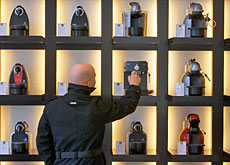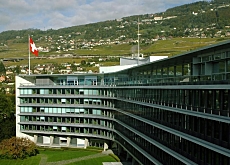WWF accuses Nestlé of illegal coffee trading

Conservation group WWF has charged several international companies, including Swiss food giant Nestlé, with buying illegally harvested coffee from Indonesia.
Nestlé insists it does not condone “unacceptable activities” and is one of a number of firms that have pledged to engage with the WWF to prevent further forest from being cleared.
Wednesday’s WWF report, Gone in an Instant, says robusta coffee – often used to make instant coffee and energy drinks – is being grown in the 324,000-hectare Bukit Barisan Selatan national park on the Indonesian island of Sumatra. According to the report, the coffee is then mixed by traders with legal beans before being exported to international companies.
This conversion of the forest for agricultural purposes drives the destruction of rhino, tiger and elephant habitats, it says.
“Nestlé never willingly purchases coffee from dubious sources,” Nestlé spokesman Robin Tickle told swissinfo. “If we have the slightest doubt about the origin, we don’t buy it.”
Tickle admitted however that it was often difficult to determine the precise origin of a particular coffee bag which has passed through different hands before reaching the Nestlé buyer.
“When you buy coffee on the open market, not directly from a producer, you cannot absolutely exclude that it comes from a dubious source,” he said. “But we do our very best to avoid buying such coffee.”
Dialogue
The report also criticises the Indonesian government for a lack of regulation in the coffee growing industry.
Nazir Foead, the charity’s director of policy and corporate engagement, said WWF was “asking multinational coffee companies to implement rigorous chain-of-custody controls to ensure that they are no longer buying illegally grown coffee, and we’re asking the Indonesian government to better protect the park”.
Tickle said Nestlé had called on the Indonesian authorities to clarify the precise origin of the coffee grown in the region.
“We have raised our concerns with the Indonesian authorities, and we very much hope that existing regulations to clarify the precise origin of the coffee grown in the region will be enforced,” he said.
Threats
According to WWF, the health and viability of the national park face three main threats: land encroachment, poaching and illegal logging. Of the three, illegal encroachment and conversion of the forest for agricultural purposes is the most serious and often drives the other two threats.
WWF said data showed that an estimated 28 per cent (or 99,904 hectares) of the park had been degraded: 60 per cent of the degraded area was being used for agricultural cultivation; the rest was covered by shrubs and grass.
Robusta coffee, a plant that’s easy to grow in hot climates, has become a common crop planted in the park. But WFF says that because the park is a World Heritage site and a protected area, the coffee is illegally planted, grown and sold.
WFF says 196,000 tonnes of robusta are illegally produced in Sumatra every year.
Tickle pointed out that “Nestlé has been working with Indonesian coffee farmers since 1994 to help them produce high-quality coffee outside the park and to take care of the environment and market their product, thereby ensuring the long-term sustainability of their businesses”.
swissinfo, Thomas Stephens
The WWF says coffee has become an important commodity for southern Sumatra, in particular the area of Lampung Province around Bukit Barisan Selatan National Park.
Coffee accounts for 73 per cent of commodities grown inside Bukit Barisan Selatan National Park and is cultivated on 45,657 hectares by small-scale farmers.
Total coffee production inside the park is estimated at 19,600 tons.
Indonesia is now the world’s fourth-largest coffee exporter, behind Brazil, Colombia and Vietnam.
WWF said Taloca, Swiss-based Kraft Foods and Nestlé were the top recipients of tainted coffee from Lampung in the years 2003, 2004 and 2005, respectively.
The United States, Germany, Japan and Italy were the largest importing countries of the coffee, accounting for more than 50 per cent of all imports from the region.

In compliance with the JTI standards
More: SWI swissinfo.ch certified by the Journalism Trust Initiative












You can find an overview of ongoing debates with our journalists here . Please join us!
If you want to start a conversation about a topic raised in this article or want to report factual errors, email us at english@swissinfo.ch.